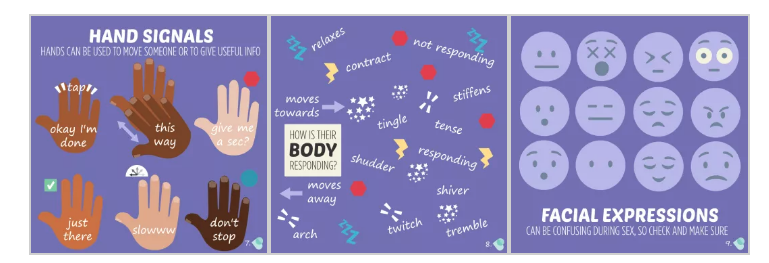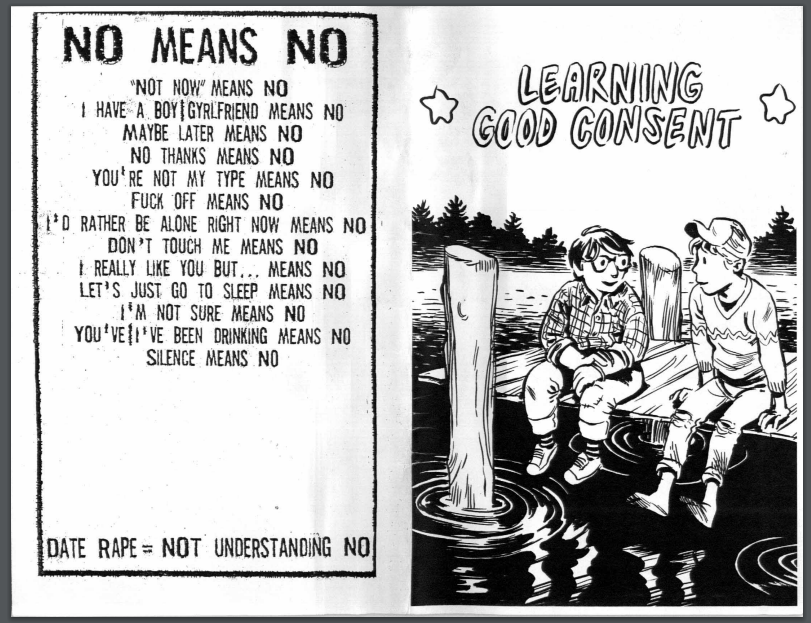When it comes to consent, it is unfortunately often compared to making a compromise. BUT that is not what it is. Consent means that two or more parties want the same thing. It’s not a deal, not a compromise, not a game. It is a matter of course for a healthy and respectful relationship.
However, a lot of people seem to be insecure when it comes to holding a consensual conversation in their relationships. Is it really necessary to ask to go forward at every little step, even in a long-term relationship? Isn’t it weird to suddenly start talking about consent?
We would like to give you a little overview and some consent 101:
Is consent something “new”?
It is – kind of. At least the implementation of consent in local legislation is something rather new. For a very long time it was taken for granted that in a marriage the couple must have sex – there was no doubt that eventually this could be without consent of one partner. This is very clearly not a consensual practice, but it was still legal. Most places just began to pass laws against marital rape in the 1990ies (e.g. Germany 1997, UK 1991, USA 1993).
Furthermore, a victim of sexual assault had to prove the attack in order to protect him or herself. Very often, a person who is affected by violence can’t defend him or herself. That’s one of the reasons why, fortunately, over the years some laws have been revised and the meaning of consent has become more understood by the general public, an understanding which is also thanks to increased media coverage of the topic.
How can we explain consent properly?
YouTuber and author Hannah Witton states in her sexual education book:
consent is…
– a voluntary, enthusiastic yes
– un-assumed
– mandatory
consent can be…
– verbal
– non-verbal
– withdrawn at any point
– for some things and not others
© Hannah Witton, “Doing it” p. 118
A few years ago, a video with the catchy name “tea is like consent” went viral. It shows how comprehensible consent actually is. A lot of educators use it to explain consent. On the other hand, sexual educator Justin Hancock also has some interesting ideas about why tea and sex might be a bad analogy. If English is not your first language, you may see it a bit differently.
How to give and ask for consent?
There are many ways to act consensually. For example, pay more attention to the body language of the other person. It could be that the other person is making sounds or noises to send a signal for a clear “yes” or “no.” If someone says things like “I don’t feel like it,” “I’m not sure,” “I don’t know” or just stays silent, it probably means “NO.” If you are not sure about it: Just ask! But if someone says something like “Yes please,” “That feels good” or “Right here” – they are probably enjoying it. If you are not sure about it: Just ask!🙂
How can you ask? Maybe you say something like “Where do you want me to touch you?” or “Tell me what you want.” There are various ways and not every way fits every person.
How to explain consent?
To give you some more ideas here are some different approaches:
Various visual explanations by Bish

Consent and sex visually explained and shareable on Instagram by Justin Hancock.
Related content from Justin Hancock on “Bish”:
- A consent teaching pack from bish training
- Sex talk and communication easily explained
- For teens and young adults: “work out what kind of sex you like“
- “What it feels like to have really good sex with consent and how you can practice with handshakes.”
- Consent and the law – UK
Educational videos by Planned Parenthood
The American non-profit organization Planned Parenthood has a small playlist of four videos on youtube that explain the matter of consent.
The videos are for educational use and directed towards young people. They cover the questions:
- How do you know if someone wants to have sex with you?
- When you know they’re into it?
- When they’re kinda into it?
- When they’re just not into it?

Creative approaches through Zines from Survivor Networks
The Philly Survivor Support Collective and some of their allies are not very active online currently, but they still share some Zines about consent to educate as well as to raise questions for teens and young adults about dealing with consent.

An extended Zine just about consent by Philly’s Pissed and Philly Stands up – and a short version.
Related zines about strategies for survivors and supporting survivors of sexual assault.
How to explain consent to kids?
When we talk about consent with kids it is more related to boundaries than talking about sexuality. This is a video from Amaze – a network of experts in the field of sexual education that we can recommend.
More about consent and kids:
- A teachers approach to teach children consent
- A video about how to teach consent as a parent
- An article on how to teach young children consent by Fatherly
- Book reviews about consent – books by “sex ed rescue”
The Wheel of Consent by Betty Martin
Consent is more than “no means no” and “yes means yes.” Betty Martin is a sexological body worker and has developed over the last decade a project she calls “The Wheel of Consent.” It is a very interesting tool to use to dig down a little deeper into the matter of consent.
Therefore she provides a series of videos in which you can learn about her concept. It’s kind of an online course. She even provides the “3-minutes-game” as a download as well as the diagram of the “Wheel of consent” in Dutch, French, German, English, Swedish, Spanish, Russian and Portuguese.
How to explain consent in other languages ?
Do you know about some resources in different languages? If yes, please let us know!
Here is a collection of some materials we have encountered.
General information about boundaries in many languages you will find on zanzu in German, English, French, Polish, Russian, Turkish, Arabic, Farsi, Bulgarian, Shqip, Romanian, Spanish, Dutch as well as audible versions.
Spanish
- An explanatory video about consent by Amaze in Mexican Spanish
- How to talk about healthy relationships – for parents in Spanish by Planned Parenthood
Turkish
- A poster with the most important facts about consent in Turkish language
German
- An explanatory video by “Queer Lexikon” about the definition and development of the concept of sexual consent
- A discussion but also definitions about violence and consent for teenage girls by the “Wiener Mädchen Channel”
- A sexual education book for teenagers with chapters about healthy relationships and consent in Hannah Wittons “Untendrum Herumreden“
If you have developed material and tools in different languages please let us know! We would be highly interested to share it here with our readers.
This article was contributed by
lil * in Austria.


